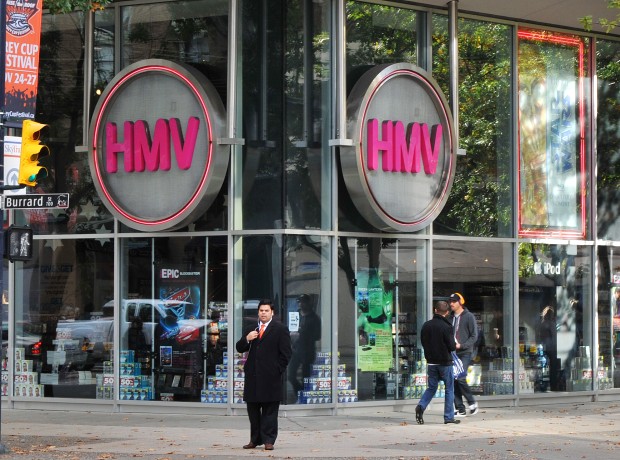This is a response to Michael Aynsley’s post “Say goodnight to the big guy: HMV to close in Vancouver“.
I live in West Vancouver, so I basically have to go across downtown every single day. Having HMV in the corner of Burrard and Robson St doesn’t necessarily mean that I shop there all the time, and yet it becomes a part of my daily routine to see the gigantic massive pink logo–HMV. However, I had said my farewell to the big guy—HMV announces its closure in November last year. This news brought up people’s attention and discussion towards the fallen records industry, and citizens hoped that HMV Canada would change their decision. Sadly the miracle didn’t become true – HMV closed down in January 2012. It had broken thousands of record supporters’ heart.
I agree to Anysley’s point that the cause of this closure is due to the rapid growth of technology. Back in the 70’s or 80’s, even 90’s, music plays an important role in people’s life. Some would spend over 50% of their income to buy records. People had less ways of leisure and music was weighed so much that it became an attitude, even a belief in life. As the technology integrates, the passion towards music shrank quickly. Consumers are introduced to multi-dimension and multi-channel ways of entertainment. The convenient and fast web downloads made the record industry almost unable to sustain, not to mention the various illegal free sharing of music and movies. This was also a crush to the music industry. Instead of publishing an album, more singers choose to produce “single” – an individual song that will not be published in the form of records. Although records have many advantages compare to digital music such as its sound and quality, but the invention of mp3 players and ipods provides consumer with more variety of music with less money spend and space consumed.
It hasn’t been easy for the record industry. As Anysley mentioned in his article, “the rise of digital options has taken a significant toll on the overall sales of CDs, with 30 per cent of music consumers in Canada now choosing to shop online.” As the generation changes, newer generations – Generation X and the Millennials are more in favor of newer technology, therefore worsen the situation for record industry. Blockbuster was down already and now the spotlight seems moving towards HMV. HMV has to make some urgent and helpful decisions to save the fallen industry and declining company. Marketing department has to burden many of the responsibilities. By adjusting its four Ps and marketing strategy, it has to win back consumers’ heart and create new features and attractions. Otherwise, we can already foreseen the future of the industry – not looking good. As I have mentioned in the title– HMV is down, who’s gonna be the next?


3 replies on “HMV is down, who’s the next?”
HMV is not the only one, many other retailers are following the same trend. It is sad to see so many familiar stores closing down in Vancouver but I figured it may be for the better. The trend of big-box retailers shifting to smaller stores seem to be more fitting in today’s market. Great post!
What do you think were the key company’s and products that decreased HMV’s sales? If you were working with HMV, are there any product lines you’d expand to save your business?
i think the music records are key products that decreased HMV’s sales. the majority of population shifted towards online music purchase. If i am working with HMV, i will suggest to emphasize on games and other electronics related products.